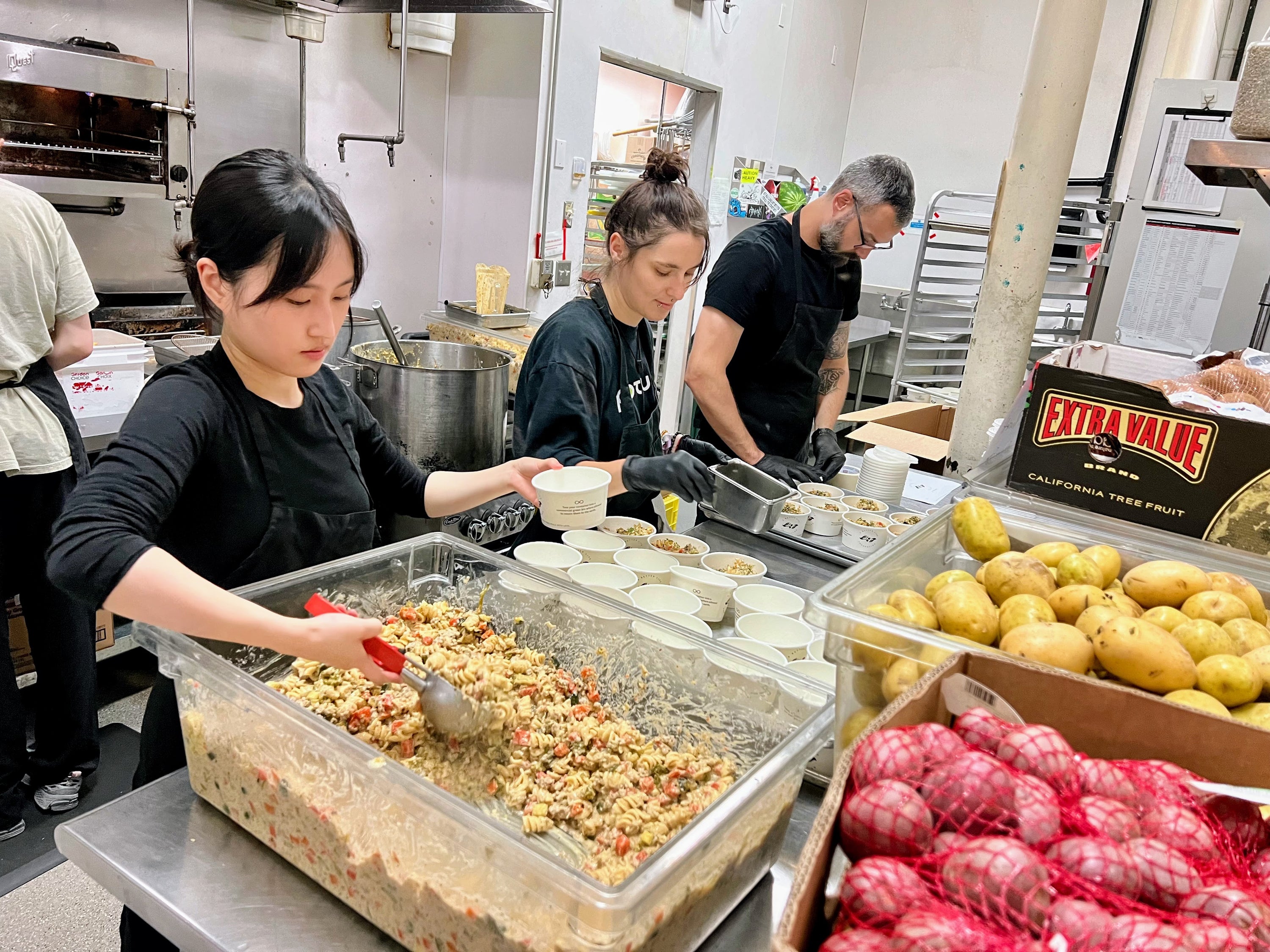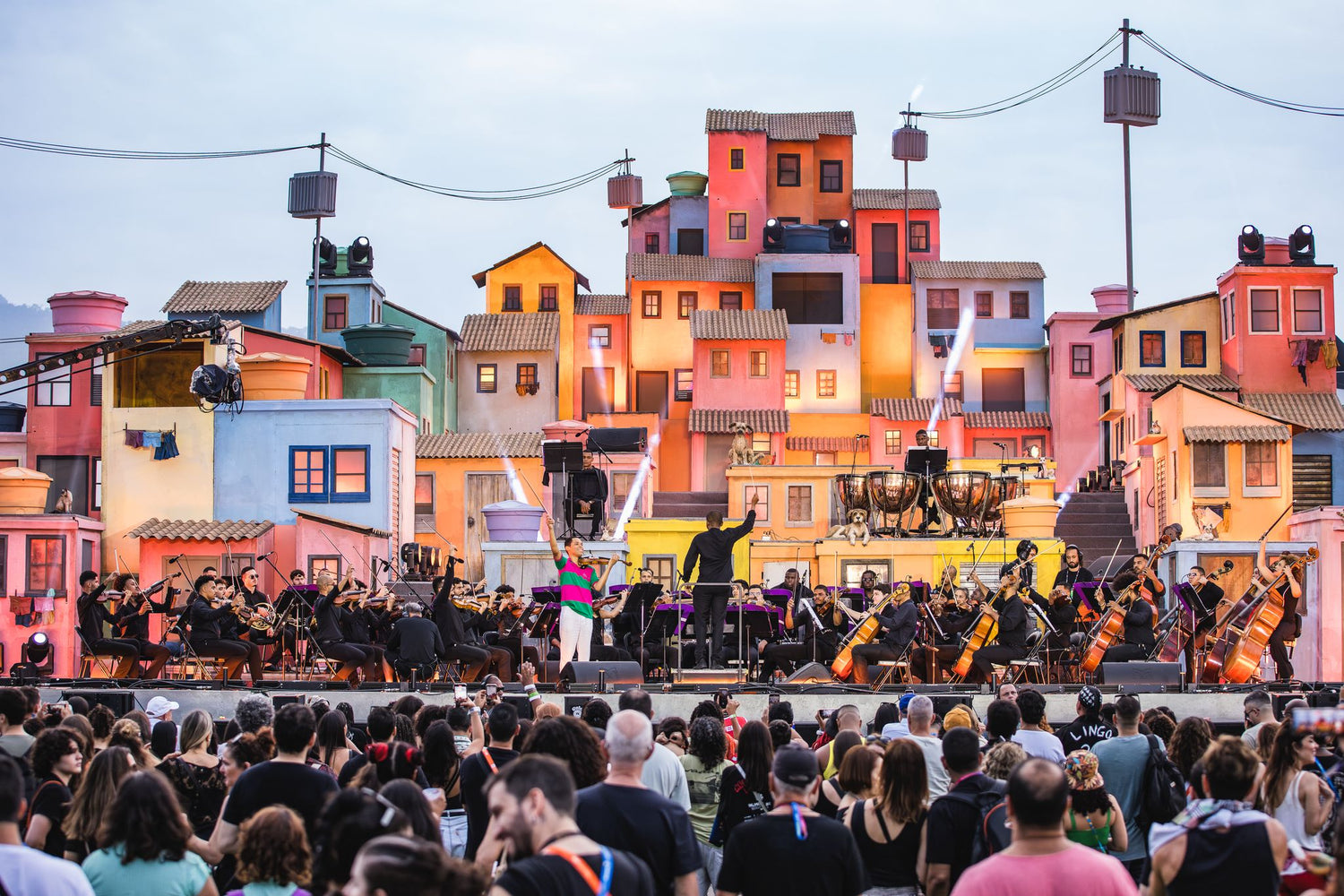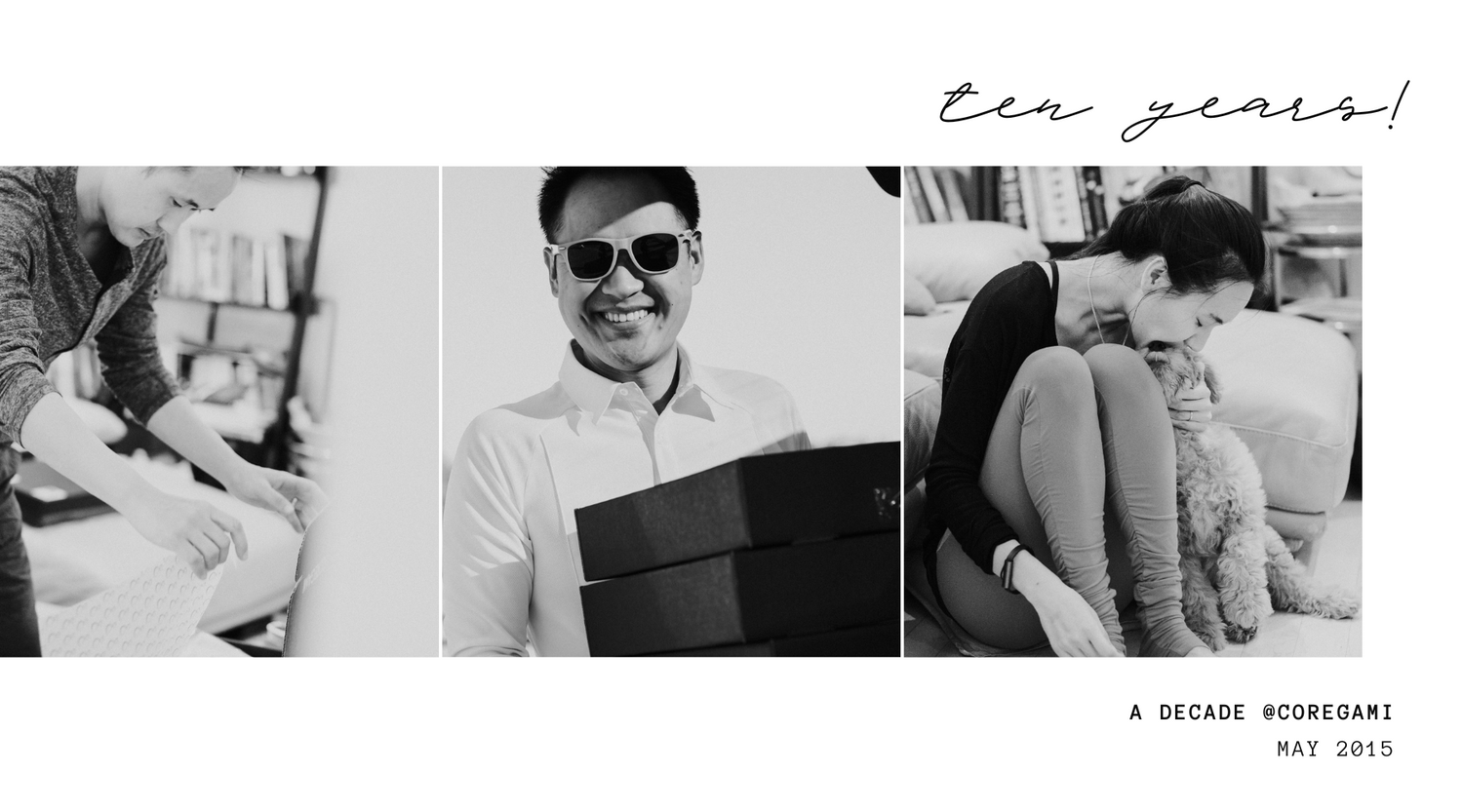Chef Chris Ito describes his work as “an episode of MasterChef every day.” But he’s not cooking for stodgy judges or haughty upper-crust diners. He’s preparing meals for the homeless, impoverished, and food insecure.
An only child raised in Toronto by first generation immigrants—a Japanese father and a Filipino mother—Ito felt his life was on rails from the get-go. “There was a prescribed path for me as to what ‘success’ looked like,” he said. “Being a top student, getting into the best schools, and getting a job. And for that job, my options were to be a doctor, and to be a doctor.”
He went to McMaster University in Ontario planning to do just that, “but I found out very quickly that there were many people smarter than me,” he joked. Scrambling for a backup plan in case he wasn’t accepted into medical school, Ito settled on engineering.
Approaching graduation, Ito looked to pursue an engineering masters, as much by “default” as conscious choice. “I was good at school, and I didn’t have as much faith in myself in the real world,” he admitted. “I just thought I should hide out in school a bit longer.” On a whim, he applied to masters programs at a slew of Ivy League schools in the United States, and was rejected by all of them save for Stanford University in California.
(Ito couch surfed at a friend’s apartment before starting school in the fall. One day, while working out at the apartment complex gym, he stuck up a conversation with the only other person there. That man was Kevin Yu, Coregami’s founder.)
Despite his Stanford degree, when Ito graduated, he couldn’t find a job. So again, he took refuge in academia, heading back to Canada to pursue yet another degree, this time a PhD.
After his PhD, he ended up back in Silicon Valley as an engineer, holding high-profile jobs at high-profile tech companies, namely Google and Facebook. “I just followed that same plan,” said Ito, “where I tried to work at big-name places because that made me feel like I was doing something important.”


Feeling a Void
Despite his on-paper success, Ito always felt something was missing in his life. He had a good life (at this point he had married and had two children), but his profession left something to be desired. It paid the bills, but it didn’t give him any sense of purpose. “I’d spent all this time climbing this tall ladder,” he said, “and I started wondering if I’d leaned it against the wrong building the whole time.”
In November 2016, he went to a 49ers game with a work colleague. The colleague mentioned that he and his family were volunteering for an organization called Hope’s Corner, making food for people in need. Ito was intrigued. The organization also allowed children to volunteer, and so he and his seven-year-old son, Benjamin, began volunteering there every Saturday.
Before long, these outings had become his favorite part of the week. “I started asking myself, ‘Why do I feel so good after Saturday morning?’” Ito said. “I loved what we were doing, the community, being of service. It was filling a hole I’d had.”
Around the same time, Ito had a growing interest in the culinary world. He’d never so much as attended a cooking class, but he found himself reading chef memoirs and watching culinary television shows. After a while, he began entertaining the idea of attending culinary school. By 2021, this interest had grown to the point where—after a Napa Valley wine tasting vacation—he and his wife toured the Culinary Institute of America.
Ito’s wife saw how much he loved the experience, and though he was hesitant, she convinced him to apply. They had money saved. Their children (Benjamin, 11, and Charlotte, 9) were maturing, requiring less time and commitment. So Ito sent in an application.
His essay focused on his desire to use culinary training to solve issues of food insecurity. “Soup kitchens are primarily run by volunteers,” he explained, ‘with good intentions, of course, but not necessarily the technical training to be economical with time, resources, money. That was my pitch to the school. I want this training, so I can do something different with it.”
“I’m a terrible writer,” he joked, “but that essay was the easiest thing I’ve ever written. It wrote itself.” Though the deadline to apply had already passed when he submitted his application, the school accepted him into its incoming class.

From Engineer to Chef
Within two weeks, he’d tendered his resignation at Facebook and found himself a student again at the age of 44. “Everyone was about 20 years younger than me,” he recalled, chuckling.
Ito’s life at the Culinary Institute felt a world apart from his former lives in academia, and in a good way. “Before it was about how do I get the best grade,” Ito said. “But this was about pure, honest interest in the material.”
He couldn’t get enough.
Ito stayed late in the library, devouring every book he could get his hands on. He took a job at the school’s restaurant to learn more in his free time. The commute was heinous—two to three hours each way, every day—but Ito didn’t mind.
After a while, driving five hours or more each day simply to attend class became borderline dangerous, so Ito decided to park his family’s Airstream trailer in a patch of nearby farmland to avoid the long commutes. He lived out of this trailer during the school week, and traveled home on the weekends. “I’d be woken up by roosters at 4:00 a.m., have goats greet me in the mornings when I stepped out of my door,” he said. “It was incredible.” (Ito continued his work at Hope’s Corner throughout his year at culinary school, and by the time he graduated, he had become the nonprofit’s president.)

Shortly after graduation, Ito and his wife had lunch out at a Michelin star restaurant in Woodside, California. He happened to have some printed resumés in his trunk, and he handed one to the waiter. That evening, he received a call from the restaurant’s chef. The following Monday, he had a working interview, and by that evening, they’d offered him a job.
“I went from being an engineer with zero culinary experience a year ago, to cooking in a Michelin star restaurant,” Ito said. He admitted that this wild turn of events was certainly down to a bit of luck, and added that “the chef probably gave me a chance because she was also a second-generation Filipino immigrant,” but he also believes that she appreciated his background in service with Hope’s Corner.
The role wasn’t without its stresses. “There are elements of truth in The Bear,” he joked. But in all, it was an incredible experience for Ito, one that gave him a wealth of confidence in his newfound career.

An Episode of MasterChef Every Day
After a year at this restaurant, Ito and his family moved to Vancouver, where he began linked up with A Better Life Foundation, a nonprofit working to aid those suffering food insecurity in the Downtown Eastside.
He began as a volunteer, working at the organization’s “Plenty of Plates” dinner events, where food insecure members of the community can come together and enjoy home-cooked meals free-of-charge. A month later (in early 2024) a full-time role opened up in the nonprofit’s Recovery Kitchen. This project has chefs making meals from ingredients rescued from grocery stores. “We feed the community with food that is perfectly good to eat, but would be wasted otherwise, and we provide that food for free,” he explained.

In short, a delivery truck arrives at A Better Life Foundation every day, full of perfectly good produce that grocery stores would otherwise throw out. Ito and his colleagues then “go shopping” in the truck, and select whatever they can use. The result is “like an episode of Master Chef every day,” he said. He’s allowed to make whatever he wants from the ingredients he finds. In many ways, he feels like he’s back in culinary school, “being given ingredients and learning to use the product to its maximum potential. Our whole ethos is to waste nothing.”
Using these donated ingredients, which would otherwise be thrown in the garbage, Ito and his colleagues produce, on average, 300 meals per day. A partner organization, Shift, picks up the meals on e-bikes and delivers them to clients around the city who are suffering food insecurity.
This all can’t happen without a few strong partnerships and committed volunteers, but the operation has an extremely low overhead. Ito has to purchase some ingredients, such as dry herbs—which aren’t typically donated—but his out-of-pocket cost is usually less than $0.20 per meal. Every meal he makes is extremely nutrient-dense, with at least four to five vegetables, proteins, and starches. “And hey, I like to think they’re pretty tasty too,” he said.

A Win-Win Situation
As he began working with Hope’s Corner and A Better Life Foundation, Ito began to see the realities behind a number of popular food insecurity misconceptions.
One is how many people are struggling to put food on the table. This isn’t just an issue faced by the homeless or unemployed. Per the U.S. Department of Agriculture Economic Research Service, a staggering 47.4 million Americans suffered from food insecurity in 2023. That’s one in seven households.
The more shocking realization, for Ito, was just how much food is out there, and how much of it goes into the trash every day. “The amount of waste that comes out of grocery stores was eye-opening,” he said. “Yes, some of it maybe is beyond its time, but the overwhelming majority are items that are just a bit bruised, or maybe have reached a ‘Best Before’ date, but still are far from spoiled.”
Ito’s work is proof that, in many communities the resources needed to mitigate the hunger crisis are already there. The process just takes someone to connect the dots. The source of the food has to be connected to someone who is able to turn that food into a meal. That person has to then be linked with someone who can deliver the meals.
Ito admitted that his work isn’t necessarily solving someone’s long term challenges. The reasons behind food insecurity are often complex, running the gamut from financial woes to mental and physical health issues to drug addiction. “We aren’t fixing the roots of those problems,” he said. “We’re just trying to make someone’s life a little easier, and maybe that helps them with the other things they’re struggling with.”
“It’s shocking how many people are struggling, and how much food is wasted,” he said. “If you can solve those at the same time, you have a win-win situation.”


Taking the Leap
For Ito, the lesson is that it’s never too late to change your course in life, whether you’re a college student struggling with a prospective degree you have no passion for, or a 55-year-old feeling burnt out by a career. “I don’t want to make it sound like it was easy,” Ito said. “It took many years for me to realize—and accept—what I really wanted.”
His biggest piece of advice is to take time to listen to what your heart is telling you. For Ito, it all started with volunteering on Saturdays at Hope’s Corner, and realizing that it was his favorite part of the week. “You don’t have to know exactly what your heart is telling you,” he said, “but if it’s pushing you in a certain direction, it’s worth following that curiosity. You don’t have to know the whole path, you just have to know the first step.”
Living like this, Ito believes, doesn’t just enrich our own lives, but the lives of those around us. Maybe it’s in a direct way, like the food insecure individuals Ito cooks for, but it can also be indirect. People who love what they do every day are happier people, kinder people, more productive people. “We owe it to ourselves to chase these dreams, but also to each other,” Ito said. “Imagine a world where everyone is listening to their heart…”

Owen Clarke is an American journalist primarily covering rock climbing and adventure motorcycling. In addition to his work for Coregami, he is a frequent contributor to Climbing, Outside, and Summit Journal, and is the Africa Climbs & Expeditions editor for the American Alpine Journal.





